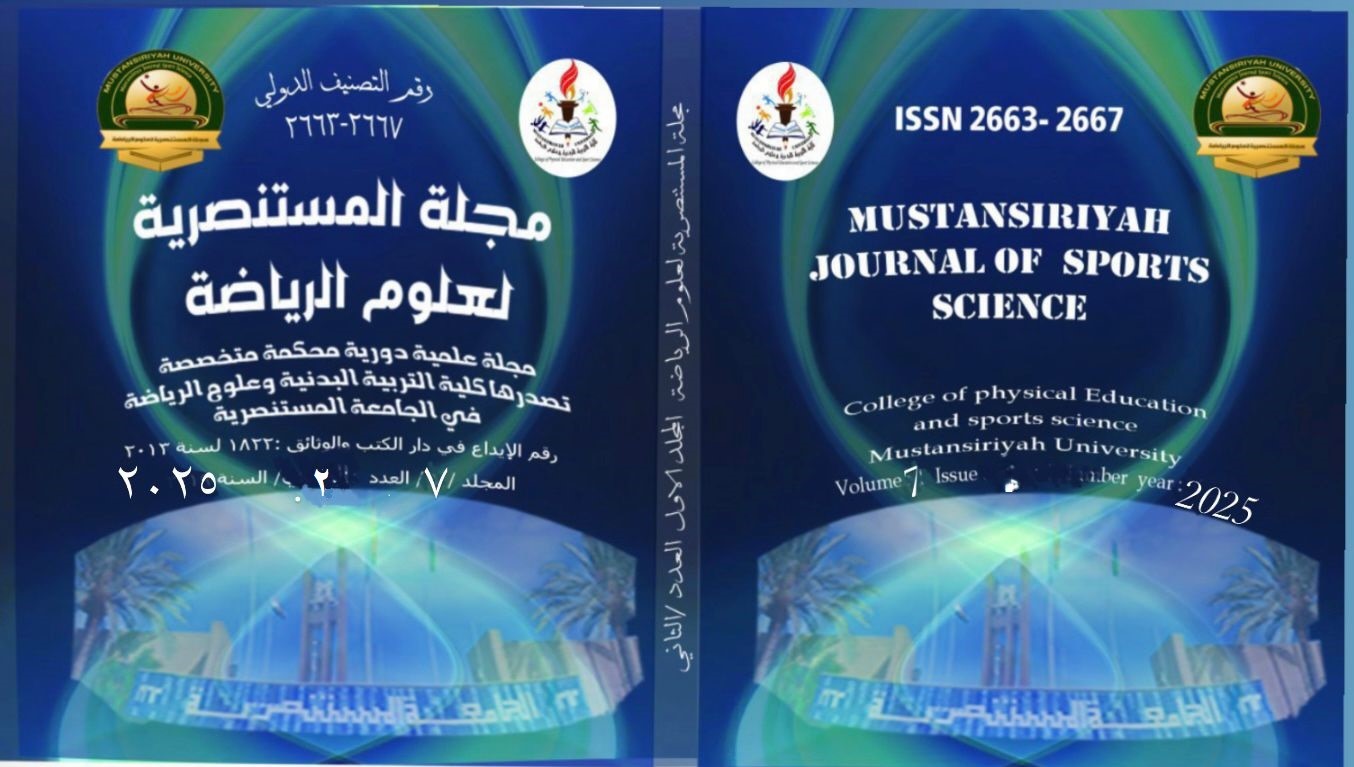Total Quality Standards and Their Relationship with Self-Efficacy Among the professors of the College of Physical Education and Sports Sciences at Al-Mustansiriyah University
Main Article Content
Abstract
This research aims to investigate the relationship between the application of Total Quality Management (TQM) standards and the level of self-efficacy among the professors of the College of Physical Education and Sports Sciences at Al-Mustansiriya University. The researchers adopted a descriptive methodology as it suits the nature of the study, with a randomly selected sample of 100 professors. Two main tools were used: a Total Quality Standards Scale and a Self-Efficacy Scale, both developed based on scientific principles to ensure validity and reliability. Statistical analysis revealed that TQM standards are highly implemented among the college professors, as all domains — leadership, strategic planning, continuous improvement, operations management, and beneficiary satisfaction — showed levels above the hypothetical mean. Additionally, results of the self-efficacy scale indicated that professors possess a high level of self-efficacy in areas such as self-confidence, achievement ability, dealing with challenges, emotional regulation, and decision-making. The findings confirmed a strong positive correlation between the application of TQM standards and self-efficacy, with a Pearson correlation coefficient of (0.72). This suggests that applying TQM standards significantly contributes to enhancing professors’ self-efficacy. Based on these findings, the study recommends continuing the systematic application of TQM practices and providing ongoing professional development programs to boost professors competencies and create a supportive and motivating work environment.
Downloads
Article Details

This work is licensed under a Creative Commons Attribution-NonCommercial 4.0 International License.
References
محمد، ع. خ. (2021). إدارة الجودة الشاملة في مؤسسات التعليم العالي: رؤية معاصرة. دار الرضا للنشر والتوزيع، عمّان.
السعدي، ف. ك. (2020). تأثير تطبيق معايير الجودة على تطوير الأداء الأكاديمي في كليات التربية البدنية. المجلة العلمية للتربية الرياضية، العدد (22)، ص: 95-112.
الجابري، م. س. (2019). الكفاءة الذاتية وعلاقتها بالتحصيل المهني لدى موظفي التعليم العالي. مجلة الدراسات الإنسانية، العدد (13)، ص: 74-90.
العبيدي، ن. ر. (2022). الجودة الشاملة كمدخل لتحسين كفاءة الأداء المؤسسي في الجامعات الحكومية. المجلة العراقية للإدارة العامة، العدد (17)، ص: 40-61.
القيسي، ش. م. (2021). فاعلية القيادة الإدارية في تعزيز معايير الجودة في الكليات الرياضية. مجلة البحوث الإدارية والتربوية، العدد (9)، ص: 132-148.
خليل، ل. م. (2020). أثر برامج التطوير المهني على تعزيز الكفاءة الذاتية لدى موظفي الجامعات. مجلة العلوم التربوية والنفسية، العدد (15)، ص: 102-118.
الربيعي، ز. ك. (2018). مدى التزام مؤسسات التعليم العالي بمعايير إدارة الجودة الشاملة من وجهة نظر العاملين فيها. دار الكتب الأكاديمية، بغداد.
هادي، س. ن. (2022). العلاقة بين الرضا الوظيفي والكفاءة الذاتية في بيئة العمل الجامعي. مجلة جامعة الكوفة للعلوم الإدارية، العدد (11)، ص: 55-71.
الشمري، ر. ن. (2021). التخطيط الاستراتيجي كأحد عناصر الجودة الشاملة وتأثيره في الأداء المؤسسي. دار اليمامة للنشر، النجف
احمد نجم عبد الله. (2024). دور التغيير التنظيمي في تنمية مستوى التكيف البيئي لدى الأندية الرياضية المؤسساتية. Mustansiriyah Journal of Sports Science, 6(4), 33–52. https://doi.org/10.62540/mjss.2024.4.6.3
محمد اسماعيل مهدي. (2024). الولاء التنظيمي لمدرسي التربية الرياضية وعلاقته باتجاهات طلابهم نحو الحركة الكشفية في المدارس الإعدادية في بعقوبة – ديالى. Mustansiriyah Journal of Sports Science, 6(4), 107–121. https://doi.org/10.62540/mjss.2024.4.6.8
صبار محمود شحاذة. (2024). الانتقاء الموضوعي بدلالة الكفاءة المهنية لمدراء المدارس الإعدادية وعلاقته في تقليل الاخفاق التنظيمي من وجهة نظر مدرسي التربية الرياضية في بعقوبة المركز. Mustansiriyah Journal of Sports Science, 6(3), 53–62. https://doi.org/10.62540/mjss.2024.3.6.5
Oakland, J. S. (2014). Total Quality Management and Operational Excellence: Text with Cases (4th ed.). Routledge.
Evans, J. R., & Lindsay, W. M. (2017). Managing for Quality and Performance Excellence (10th ed.). Cengage Learning

